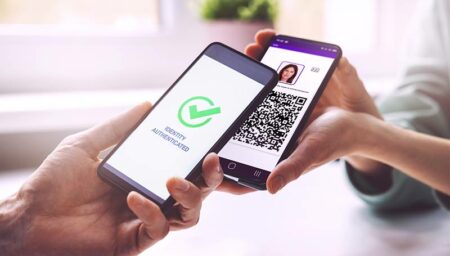Proving your identity with a smartphone

Mobile ID open access to new, convenient services, both online and in-person. They also give users more control over their personal information and the way they communicate with businesses or government agencies, accompanying the trend of moving public and private services online. Here’s how.
Such power in our hands. A modern smartphone is 5,000 times faster than the supercomputer CRAY-2 – the fastest and most powerful machine ever built in 1985. It can also complete in less than a second all of the calculations needed to guide Apollo 11 to the moon, and perform a much wider range of tasks, from making phone calls to playing video games. This explains why, over the past years, smartphones have replaced our physical maps and mail, our transportation cards, our credit cards… and are now on the verge of adding a very useful service: identity documents.
Mobile IDs are secure digital versions of an identity document, stored on the user’s device and allowing for the user to share personal attributes (such as photo, name, date of birth, etc.) with a verifier. Using encryption and secure hardware, they reduce the time, effort, and expense needed to provide legal proof of identity, such as opening a bank account, boarding a plane, making purchases online or renting a car.
As Mobile IDs can be used in many situations, online or ’in real life,’ they simplify citizen lives while adding an additional level of security and privacy.
Julien DROUET, VP Identity Solutions at IDEMIA
Little doubt remains about the benefits Mobile IDs bring to our daily life. But there still might be consumer disbelief that a digital system could be as secure as a physical card, and more protective of your privacy. Yet, identity documents in their current form have two major limitations. First, showing them reveals all personal information to the verifier, who can collect, scan, or store it at will. Does this identifier really need to know your name and address when you only want to buy a lottery ticket, benefit from an age-restricted service, or retrieve your prescriptions?
Second, common identification documents are only usable in-person, not in a crucial modern space: online… where more and more public and private services have moved, and where dealing with multiple usernames and passwords can create frustrating digital journeys.
Mobile IDs tackle these limitations, giving citizens more control over the personal information they share and providing them with a way to securely identify themselves, both in person and online.
Teresa Wu, Vice President Smart Credentials at IDEMIA I&S North America

We face four major reluctances when asked to share our personal identification document: where, what, who, how. Where is my data stored? What information precisely, and to what end? Who has access to my data, and to what data? How can I control who gets access while at the same time enjoying the services I need? The privacy-by-design guiding Mobile IDs answers these questions: Where? In my phone, and only there, protected and encrypted; What? Not more than I’ll be willing to share in a precise situation; Who? Only the person I’m showing it to; How? By controlling that both the usage and the sharing remain under my control.
Julien DROUET, VP Identity Solutions at IDEMIA
Mobile ID also protects personal information from being stolen, limiting the obligation to provide copies of supporting documents. The data is securely stored on the device, either in a dedicated app or in an OEM Wallet. Each piece of information is encrypted, made unreadable and then stored individually—in your phone only. Encryption and multifactor authentication methods ensure that an individual’s personal information can be shared with authorized parties, thereby minimizing the risk of identity theft or fraud. Even if a device is lost or stolen, the ID remains protected by biometrics. The identification data can also be remotely wiped, and users will still be able to use their physical ID. Digital identities can hence help tackle fraud by reducing the amount of personal data shared online and making it harder for fraudsters to obtain and use stolen identities.
Of course, linking identity characteristics to systems of record (such as a DMV) requires high levels of trust, security, and privacy. Therefore, it is important to choose implementations that are transparent about their privacy practices and give users control over their data.

This privacy-by-design approach allows citizens to decide what information to share and with whom, thus strengthening their privacy rights. For instance, for an age-restricted purchase or service, users can accept or decline to share their attribute to prove they are ‘over 18’ without showing irrelevant, personal data such as their name or address.
Teresa Wu, Vice President Smart Credentials at IDEMIA I&S North America
Mobile IDs bring other benefits: digital credentials can be issued remotely; delays are significantly shortened; and the lifecycle management, i.e., the upgrade of attributes (such as address or availability to drive a type of vehicle) is facilitated.
But the greatest improvements of all might be the opening to a safer digital world; the ability to access public and private services in a secure and convenient way, with a right level of assurance that my identity is protected and under my control.
Julien DROUET, VP Identity Solutions at IDEMIA
Mobile ID doesn’t only enhance user privacy, it’s also the answer to today’s cybersecurity challenges. Cybersecurity needs more than data security, network security and machine security: there’s no real cybersecurity without a trusted and verifiable identity…
Teresa Wu, Vice President Smart Credentials at IDEMIA I&S North America
From a fraud prevention perspective, Mobile IDs carry real promise for government agencies. As for citizens, who now have a solution to better transact online or in-person: making a reservation at a car rental without having to show one’s physical driver’s license; signing up for a government service without having to submit any paperwork; logging on to online services without having to worry about fraud, accessing government services without having to remember multiple usernames and passwords… There still was a missing link between security and convenience—Mobile ID provides it.

Latest News
Related Content